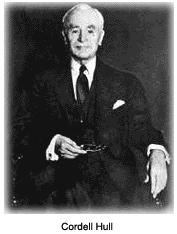Born in a log cabin in Pickett County, Tennessee, on October 2, 1871, Cordell Hull was one of five sons of farmer William and Elizabeth (Riley) Hull. From an early age, Cordell wanted to be a lawyer and later received his law degree from Cumberland University at Lebanon, Tennessee, in 1891 after taking a one-year course. At the tender age of 19, Hull set up his law practice in Celina, Tennessee, but decided to enter the political arena at age 21 because of his involvement with politics in college. He ran for, and won, a seat in the Tennessee House of Representatives, where he remained from 1893 through 1897. Following a brief stint as a captain of the Fourth Tennessee Regiment in the Spanish-American War, Hull returned to his law practice in Gainsboro, Tennessee, until he was appointed Judge of the Fifth District Court. It was then that he got the nickname "Judge." In 1907, Hull was elected to the U.S. House of Representatives, where he served until 1931, interrupted only by two years of service as the chairman of the Democratic National Committee, then he went on to the U.S. Senate from 1931 to 1933.
 During his 23-year tenure in Congress, Hull was a member of the House Ways and Means Committee, author of the first Federal Income Tax bill and Federal and State Inheritance Tax Law, as well as other laws related to trade and commerce. He became recognized as an expert in commercial and fiscal policies.
During his 23-year tenure in Congress, Hull was a member of the House Ways and Means Committee, author of the first Federal Income Tax bill and Federal and State Inheritance Tax Law, as well as other laws related to trade and commerce. He became recognized as an expert in commercial and fiscal policies.
Partly due to that recognition, Hull was appointed Secretary of State by President Franklin D. Roosevelt on March 4, 1933. He held that post for nearly 12 years.
During Hull's historically long period as secretary of state, he negotiated reciprocal trade agreements with numerous countries, lowered trade tariffs and stimulated trade. He also headed or attended such international meetings as the Monetary and Economic Conference in 1933, the seventh Pan-American Conference, and the Inter-American Conference for the Maintenance of Peace in 1936. He is credited with implementing Roosevelt's Good Neighbor Policy among 21 Western Hemisphere nations. Hull became the most respected and popular officer within Roosevelt's cabinet.
In 1944, the secretary was appointed to the War Refugee Board, along with Secretary of Treasury Henry Morgenthau Jr. and Secretary of War Henry L. Stimson, which was established by Executive Order No. 9417. The board was set up to "rescue the victims of enemy oppression ...in imminent danger of death...", in effect, as a way to address the overwhelming evidence of the mass extermination of Jewish people throughout Germany and other parts of Europe. Up to that point, Roosevelt had no power to respond to reports of The Holocaust.
After the United States' entrance into World War II, Hull and the State Department spent much time laying the groundwork for a future organization empowered to continue and strengthen peace and cooperation among nations, as well as establishing legislative, economic and military power to achieve those objectives. For this, Hull was called the "Father of the United Nations" by President Roosevelt and was later honored with the Nobel Prize for Peace.
Because of failing health, Hull resigned as secretary of state, effective after the presidential elections in November 1944, even though he had been invited by Roosevelt to join him on the ticket. The vice presidency was given instead to Harry S. Truman. His resignation also came prior to the signing of the United Nations Charter. However, Hull was later persuaded to serve as member and senior advisor at the United Nations Conference in San Francisco in 1945.
In the late forties, Hull published his Memoirs of Cordell Hull (1948), which chronicled his life and activities in the political arena. Near the conclusion of Hull's memoir, he wrote of his vision for the future:
"I am convinced that the horizons of achievement still stretch before us like the unending Plains. And no achievement can be higher than that of working in harmony with other nations so that the lash of war may be lifted from our backs and a peace of lasting friendship descend upon us."Hull died on July 23, 1955, in Bethesda Naval Hospital, and was interred in the National Cathedral in Washington, D.C.